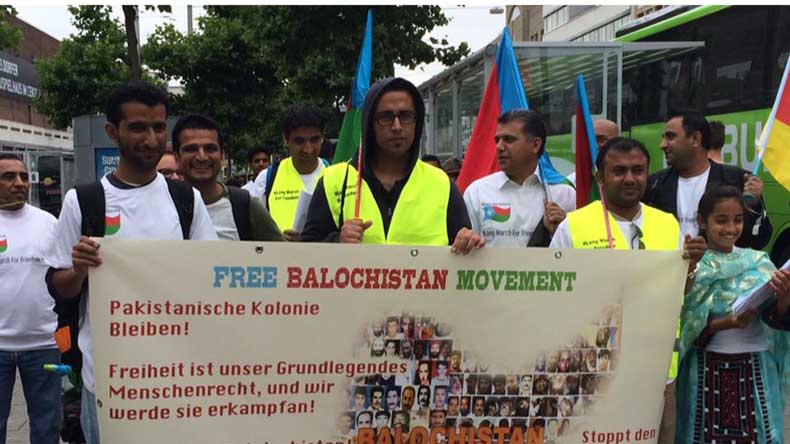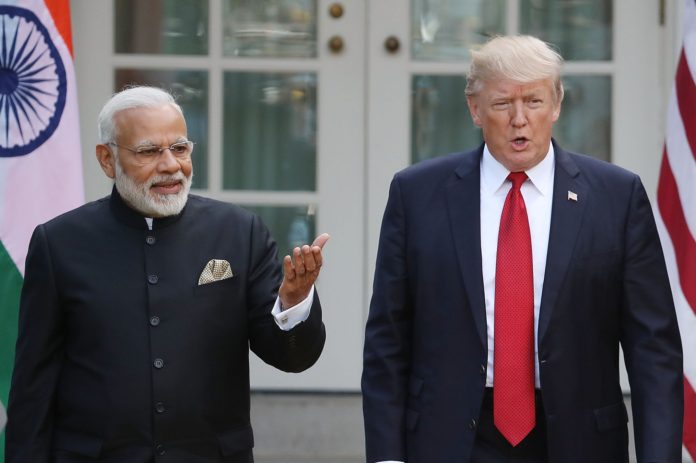All of a sudden it has dawned upon the Trump administration that China’s One Belt One Road (OBOR) project passes through ‘disputed territory’, hence the US must oppose it. For quite some time, China phobia has paralyzed rational thinking in the US policy making circles, the malice is bipartisan. Earlier Obama had also opposed setting up of Asian Infrastructure Investment Bank (AIIB) by China, but he was shocked to find close American allies making a bee line to join the AIIB as its founding members.
In his recent briefing to the US lawmakers on the Pak-Afghan region, US Defence Secretary James Mattis had commented that the US was opposed the One Belt, One Road policy in principle because in a globalized world there were many belts and many roads, and no one nation should put itself into a position of dictating One Belt, One Road: “The One Belt, One Road also goes through disputed territory, and I think that in itself shows the vulnerability of trying to establish that sort of a dictate.” Earlier, this claim had been made by India with the view to thwart the multi-billion dollar connectivity project that will link Gwadar to China’s Xinjiang. Existence of this dirty nexus has been well known for quite some time, but Americans were publically maintaining obscurity. Now the US has emerged from the shadows and is standing rock firm behind India. Something better has happened in the form of Mad Dog’s confession, it will be easier to handle the unholy alliance. China and Pakistan have already issued the rebuttal.
India is a mediocre polity with half of its population underfed, some of its social security indicators like infant mortality and school dropout rates are comparable with some underdeveloped African countries. Indian has been able to keep a steady growth rate for over a decade and a half or so. Strategically America has coopted it as a cheaper deterrence against China in which it failed its first field test in Doklam. Cumulatively, paltry economic growth and American support to India for playing a regional gangster’s role has created a misplaced delusion in Indian strategic thinking of having become a global power. Behaving like a superpower has gone into its head and cost it a lot economically; for such a role throwing money here and there to sustain a big power image is not sustainable by Indian economy. China was able to outsmart India in accruing rights for Hanbantota port. India pledged $ 20 billion investment for Iran’s Chabahar port, but has not been able to touch even $ 20 million mark.
Though India may be marginally rising economically yet it is happening in the shadow of China’s impressive ascent. Beijing’s influence will almost certainly continue to grow and has already unhinged Asia’s traditional geopolitical pegging. While Chine is here—an immediate neighbor, the US is far out there—continental distances away, with a known history of switching sides. India’s options could be: staying unaligned, hedging, building indigenous military power, forming regional partnerships, aligning with China, or aligning with the United States. Leaving aside more rational options, India has already chosen a closer alignment with Washington to counter China, while efforts to foster regional partnerships and cultivate domestic military capabilities could play a complementary role.

China’s clout in the established international organizations like the United Nations and in new institutions being set up by China, such as the Asian Infrastructure Investment Bank, presents a dilemma to India. China could hamper Indian interests and goals in multilateral forums, especially when it comes to reforming these institutions and giving India a greater voice in global affairs. Even though logically India should be aligning with China for empowering Asian leadership in Asia, it has chosen to be on the wrong side of history by offering rental services to the US for upsetting whatever semblance of stability Asia has. Asia has around five power centres, at times working at cross purposes and with no closing of ranks amongst them in sight, the vision of 21st century as the century of Asia’s rise is no better than a fictional hype.
After facing strategic fiasco in Doklam, India is all set to engage China in a proxy war in Balochistan with the objective of disrupting implementation of China Pakistan Economic Corridor (CPEC). On behest of India, separatist Baloch elements have widened the focus to jointly demonize China and Pakistan. During the initial phase, India is using Baloch dissidents to do this bidding while using the soil of third countries—especially in Europe. Demeaning China is becoming popular amongst these dissidents because it pleases India and the US in one go and brings in lot of finances as well as supportive political and diplomatic capital. And as an added benefit Europeans go easy on the activities of these pseudo representatives of Balochistan.
India’s trouble making in Balochistan has a long history, but now there is a qualitative shift in the focus. So far it was directed against Pakistan in general and the people of Balochistan in particular. During yesteryears, India facilitated alignment of estranged Baloch dissidents (read nationalist chieftains and their scions & siblings) with erstwhile USSR, now India is financing them to launch their effort from Europe under the garb of Human Rights. Ironically, some of these tribal chiefs are amongst the worst usurpers of Human Rights. They have a track record of resisting the government efforts towards improving social security of their people by obstructing developmental projects in their respective areas.
Baloch dissident Ahmar Masti Khan’s ‘American Friends of Balochistan’ held an event at the National Press Club in Washington on August 25 that was titled “Politics Behind Assassination of Nawab Akbar Bugti”. Participants promoted the notion that Akbar Bugti was killed “because the Pakistan Army and China had ill intentions towards the CPEC, Gwadar and Balochistan’s natural resources”. This event did not get much media attention due to low credibility of Masti.
Balochistan is a politically mainstream province of Pakistan. Baloch population wholeheartedly participated in the 2013 elections and subsequently was the first province to conduct municipal bodies’ elections. Voter turnout in these two elections was quite high; women also turned out in unexpectedly high numbers to cast their votes. Later, mid-way of the electoral term, there was a peaceful transition from one to another chief minister in-line with a previously agreed to political arrangement.
A fairly stable political process in Balochistan does not support the views of separatist elements, that is why these disgruntled dissidents are afraid to become part of any political process, and they rely on staying abroad and remote controlling the handful supporters to carry out terrorist activities in Balochistan and beyond.
A potent Indian intelligence network operates from neighbouring Iran and Afghanistan. Iran was caught unawares with the capture of Indian Naval Commander Kulbhushan Jadhav who was stationed at Chabahar port city of Iran. Iran was not aware that India was clandestinely using its soil for carrying out terrorist activities in Balochistan and beyond. Iran has assured Pakistan at the highest level that it won’t allow any third party to use its territory for illegitimate acts.
Earlier last month, India had spent huge amount in arranging display of Free Balochistan posters in Geneva on the eve of 36th session of Human Rights Council. The end result was embarrassing for India as a number of Indian organizations struggling for the right of self-determination, autonomy and independence from India were quick to pick up cues and display similar banners for their respective cause.

On September 30, Harbyar Mari’s “Free Balochistan Movement” (FBM) organized a protest in Gottingen, Germany on the eve of “Chinese National Day”. This has been done on the line of Indian tune of obnoxious narrative about China’s neo-colonialism and human rights violations in Balochistan. The protest organizers stated that “China and Pakistan nexus is aimed to turn Baloch demography into a minority”. Baloch Student Organization-Azad (BSO) has also held a demonstration outside 10 Downing Street on October 01 to highlight Pakistan’s alleged “war crimes in Balochistan”.
As the tide has been turned on India financed terrorism in Balochistan, and space has been squeezed on its proxies in Balochistan, India has hired dissidents to keep the issue stirring in European capitals. The core objective is to disrupt progress on CPEC. Nonetheless, India is in a terrible lag, as most of the CPEC related projects are near completion. India is well aware about the significance of CPEC and is unable to digest the advantages it is bringing to the people of Pakistan in general and masses of Balochistan in particular.
Pakistan, however, needs to take such issues more seriously, a demarche to the German ambassador is overdue. This is not the first time that German soil has been used for destabilizing third countries. Moreover, Pakistan needs to embed a feature in its foreign policy for dealing with such countries which take pleasure in promoting events against Pakistan’s territorial integrity in the name of freedom of speech and Human Rights, etc.
India faces critical strategic choices in Asia and must contend with complex geopolitical uncertainties imposed by a powerful and assertive China, but India is not ready to reconcile with the peaceful rise of China. And to obstruct China’s rise, India has embarked upon hampering the execution of CPEC related projects. In an indecent hurry to accrue the title and benefits of a superpower, India is doing whatever it could to impede China’s peaceful rise.
In an article carried by Carnegie India, Rajesh Rajagopalan, a professor of international politics at Jawaharlal Nehru University has argued that partnership with the United States is the most effective approach to outpace China’s growth. In his article captioned: “India’s Strategic Choices: China and the Balance of Power in Asia”, Rajesh adds: “Though India has considerable military power, China’s forces are already stronger and better-funded…China’s alignment with Pakistan and deepening relations with other South Asian countries represents a significant challenge to India’s position in the region…”. He worries that “ Beijing’s ability to provide financial assistance and balance against New Delhi may tempt India’s smaller neighbours to play one power against the other, undermining India in its own backyard”.
The writer conveniently turns blind eye on the Indian role of financing favourite parties during previous elections in some of the South Asian countries, more specifically Sri Lanka and Bangladesh. Moreover, India’s arm twisting of Nepal and Bhutan during the Modi era has forced South Asian countries to look towards China as a savior against Indian high handedness. India’s strategic failure to stand on its feet during the Doklam crisis has sent a strong message that India id no match to China. And that it is China and not India that would be calling the shots in Asia.
The Professor goes on to argue: “China’s spectacular economic growth gives it great wealth as well as the power and influence that come with such prosperity. Yet an argument could conceivably be made that Pakistan and its asymmetric strategy of supporting terrorism against India represents a more immediate threat. Even so, China’s recent aggressive behavior—toward India and toward other neighbors makes it difficult to assume that China is any less of a short-term threat to India than Pakistan”.
China phobia is overtaking rational Indian calculus. And with Modi in the driving seat, India is more likely to be lesser inclined towards rational decision making. India is not likely to acquire the capability, any time soon, to take on China in an interstate war. However, with tools readily available to India for fighting China through proxies, in a third county–Pakistan, Balochistan could become the future arena for Indo-China proxy war, even though to the Chinese abhorrence. Pakistan needs to look into such an evolving scenario and take appropriate measure to nub the evil in the bud.




